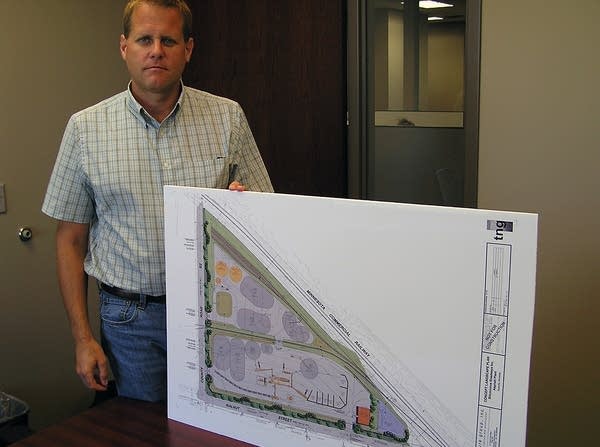Proposed asphalt plant in Roseville faces resident opposition

A major Twin Cities asphalt manufacturer has run into strong opposition over a new plant in Roseville.
Mendota Heights-based Bituminous Roadways wants to build an asphalt plant in the northern inner ring suburb. State pollution control officials say the asphalt plant poses no human health risks.
However, residents who live near the proposed facility don't believe it, and Roseville elected officials have lined up against it.
Megan Dushin and other residents are very protective of the green, leafy environment in their Roseville neighborhood.
Create a More Connected Minnesota
MPR News is your trusted resource for the news you need. With your support, MPR News brings accessible, courageous journalism and authentic conversation to everyone - free of paywalls and barriers. Your gift makes a difference.
"We bought it because of the large lot sizes in that area, it's almost half an acre and we have three or four old oak trees," Dushin said.

It's not unusual on a drive through the neighborhood to see wild turkeys lunching in front of a house or a couple of young deer dozing on a spacious front lawn.
There's a different reality just beyond a high noise wall.
The neighborhood in the southwest corner of Roseville is bounded by two state highways and Interstate 35W. Thousands of cars and trucks stream by each day.
The Bituminous Roadways asphalt plant is proposed for a 14-acre piece of land across the roadways in an area of the city zoned for heavy industry.
Resident Mary Manns said she has lived in the neighborhood 40 years and watched as growth has compromised the quality of life.
"Now, it's never, ever quiet," Manns said. "Day, night, 24 hours a day, every single day of the year we have traffic noise."

Many residents see the proposed asphalt plant and the more than 600 trucks a day it would add as the latest assault on their neighborhood and their property values.
But Bituminous Roadways president Kent Peterson sees a business opportunity.
"There [are] a lot of parking lots and roadways throughout Roseville and surrounding communities that we have built and we want to continue servicing that market," Peterson said.
Making asphalt starts with asphalt cement, a byproduct of distilling crude oil. It's then heated to 300 degrees, sand and gravel are added, and the result is the black bituminous used these days on most of the state's roads and on countless parking lots and driveways. Making asphalt creates dust and the rotten egg smell of hydrogen sulfide.
Minnesota Pollution Control Agency planner Kevin Kain said the agency did an environmental assessment of the Bituminous Roadways plan, and found little if any threat to people from the plant's emissions.

"Human health effects are unlikely from this project as it's currently proposed," Kain said.
Kain said Bituminous Roadways' three other plants in the Twin Cities do not have a record of problems. President Kent Peterson said building a Roseville plant would allow the company to close a smaller plant in Minneapolis.
Peterson also said the current proposal includes filters to capture dust and the hydrogen sulfide gas that are emitted during asphalt production, measures that he ways would make the plant the cleanest in Minnesota. There are about 100 asphalt plants in the state.
Bituminous Roadways' facility in south Minneapolis is next to an apartment building and across the street from homeowners, including Juan Sivri and his family.
Sivri said he'd be happy to see the asphalt plant go away.
"Smells bad, dust into here, that's why we don't like it in here," Sivri said.
At the moment, the Roseville asphalt plant proposal appears headed for defeat. Roseville City Council member Dan Roe, who is also running for Roseville mayor this year, said his count shows most, if not all of the five-member council oppose the project.
Roe said the promise of a job-creating business and a new property tax payer does not trump neighborhood concerns.
"While it is a difficult economic time we do have to be careful not to put too strong an emphasis on economic development at the expense of neighborhoods that have been long established over time," Roe said.
A Roseville City Council vote on the project may come later this year or early next year. The actual vote by the council, whenever it occurs, will be on a request by Bituminous Roadways for a conditional use permit to store uncovered sand and gravel on the site.
The actual manufacturing of asphalt does not need a city permit, but storage of production materials without a covering does require a permit.
